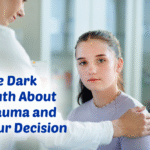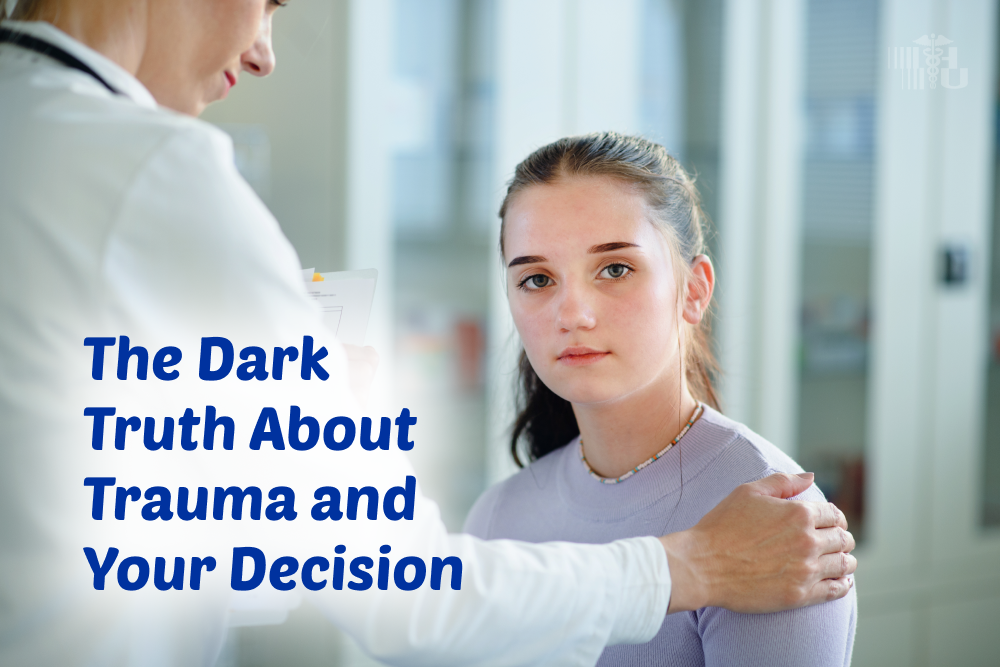Childhood trauma, including abuse, neglect, loss, or exposure to violence, can have a significant impact on how the brain develops, especially in areas related to impulse control, emotion management, and logical thought. A “Trauma Lens” is formed by this early suffering, which influences how people view the world and make decisions throughout their lives.
Poor relationships, money, employment, or health choices result from externally imposed ignorance or lack of willpower. However, behind the surface, those decisions might be influenced by ingrained emotional patterns connected to early experiences of instability, abuse, or neglect.
What is Childhood Trauma?
Regarding neurology, trauma damages the prefrontal cortex, which controls planning and decision-making, and dysregulates the amygdala, the brain’s emotional alarm system. As a result, even in safe circumstances, adults who have experienced childhood trauma frequently exhibit emotional dysregulation, elevated stress responses, anxiety, depression, impulsivity, trouble trusting their judgment, and ongoing fear.
Trauma and Adult Decision-Making
These brain changes influence adult decision-making patterns, sometimes leading to repeated unhealthy behaviors such as choosing toxic relationships, avoiding decisions, overspending, or overcommitting out of fear of abandonment. Curiously, some studies indicate that a more utilitarian moral decision-making style may also be associated with early trauma, maybe as a protective response.
- Inability to control emotions, which results in rash or avoidant decisions
- An ongoing sense of fear or distrust that impairs judgment
- Continuing bad habits, such as harmful relationships or poor money management
- Overcommitment motivated by a fear of being rejected or unworthy
How Trauma Affects the Brain and Behavioral Health?
Chronic early-life trauma exposure is known to damage the prefrontal cortex, which is in charge of rational thought and planning, and dysregulate the amygdala, the brain’s emotional warning system. In terms of behavior, trauma survivors may display signs like emotional numbness, hypervigilance, impatience, or avoiding circumstances that bring up the experience. These reactions are frequently unintentional survival mechanisms created to deal with extreme stress, anxiety, and depression. Particularly in children, trauma can manifest as violence, disengagement, or challenges in relationships and education. These habits have the potential to become deeply embedded if left untreated, impacting relationships, quality of life, and long-term mental health.
Harmony United Psychiatric Care is a premier mental health clinic serving communities across Florida.
Find a provider near you
The Complex Effects: Negative and Positive
The diverse nature of real-world repercussions is reflected in the complex ramifications of any circumstance, choice, or innovation, which frequently include positive and negative outcomes. Additionally, improvements or modifications could result in development, increased productivity, or improved well-being for example, how technology can facilitate communication and information access. However, adverse effects of these same innovations can potentially include increasing dependency, privacy issues, or employment displacement. Understanding these two effects necessitates a balanced viewpoint that considers both immediate advantages and long-term implications, as well as who benefits and who loses. People and societies cannot make responsible decisions unless they consider all perspectives.
How Mental Health Experts Support Healing and Growth
To reverse these ingrained effects, mental health specialists are essential. Therapists offer emotional support to develop resilience and better coping mechanisms, psychologists employ methods like Cognitive behavioral therapy and EMDR to reframe trauma, and psychiatrists can treat biological symptoms with medication. People can restore emotional control, rewire their brain’s responses, and increase their confidence in their judgment with the proper intervention.
Healing: The Key to Emotional Resilience and Growth
It is essential to comprehend these ingrained influences. Trauma impacts the past and takes control of present choices and future possibilities. Survivors who receive mental health treatment, such as counseling and occasionally medication, can retrain their brain’s responses, build emotional resilience, and regain trust in their decision-making.
Through changes in brain function and emotional patterns, childhood trauma influences adult decision-making. While this can often lead to challenges, it can sometimes lead to adaptive ability. Understanding this connection makes it possible to provide survivors with compassionate, trauma-informed care that enables them to recover and make better choices.
Harmony United Psychiatric Care Florida, provides essential care with our professional and board-certified team of Psychiatrists, Psychologists, and Therapists. You obtain a secure and customized treatment for your mental health issues, including eating disorders, PTSD, bipolar disorders, stress, anxiety, depression, and OCD.
For more information about mental health conditions, visit our Mental Health Library page. To understand and cope with your major depressive disorder symptoms, get help from our top psychiatrists, psychologists, and therapists, who are known for providing the best mental health treatment and psychiatry services. To book an appointment, please call us at (800) 457-4573 or submit an appointment request.
Reference Links:



Leave a Reply